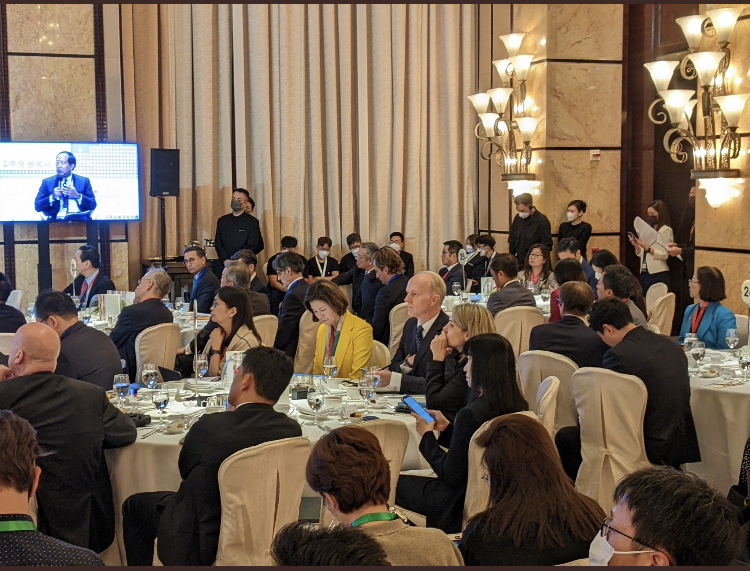From Apple and Google to Hilton and Marriott, the businesses that frequently come out on top as the most desirable places to work are all imbued with a strong sense of company spirit and culture. Whether that’s weekly TGIF meetings at Google, where staff can address questions to founders Larry and Sergey and other senior management members, or Marriott’s support of homeless charities and community concerns such as the Freshwater Conservation Programme in China, the success of these globally renowned brands can – at least in part – be attributed to their cohesive company culture, a lesson worth noting for those who want to stay competitive.
Managers who still view the cultivation of a company culture as an added expense they could do without – despite plenty of evidence to the contrary – should consider James Heskett’s 2011 book The Culture Cycle, which asserts that corporate culture’s impact on profit can be directly measured, as engaged managers are much more likely to remain in a company, which results in lower recruiting, hiring and training costs. Senior executives should also take note that effective teamwork among an organisation’s top management makes employees happier and more productive, according to research carried out by the journal Human Relations in 2012.

Small but significant acts can go a long way towards developing team spirit. To make new staff feel part of company culture from the minute they step over the threshold, Intel welcomes new employees by rolling out the red carpet – literally – once a quarter. During the first day of orientation, employees walk along a pathway lined with Intel
Studios’ photographers and videographers before introducing themselves on stage and receiving their welcome packages and a round of applause from an audience of new colleagues. US retailer Quiktrip also has a clever “getting to know you” idea: on an employee’s first day, they’re seated at desks with a tub of candy, which encourages colleagues to stop by and introduce themselves.
A more long-term commitment to company spirit includes the Allianz International Olympics, which is held every four years for its sports teams. In 2010, the games were held in Budapest and more than 70 countries participated. The company covered the athletes’ expenses and held an opening ceremony to further boost team spirit.
STAFF RECOGNITION
Such employee-friendly endeavours ensure that Allianz, Quiktrip and Intel frequently feature on the “best places to work” listings alongside big hitters such as Google. Another company that regularly makes it onto such lists – it ranked 63 out of 100 on CNN’s “Best Companies to Work for” list in 2013 – is data storage company Hitachi Data Systems (HDS).
Amy Li, senior HR director – APAC, Hitachi Data Systems, says: “At HDS, we strive to provide the best working environment for employees as it not only helps them realise their potential, but also enables us to continue to innovate and provide the best solutions to address customers’ business challenges.” Li explains that it fosters “Hitachi Spirit”,and helps to reinforce company culture across three categories: Wa (Harmony, Trust and Respect), Makoto (Sincerity, Fairness, Honesty and Integrity) and Kaitakusha-Seishin (Pioneering Spirit and Challenge).
She says: “We’ve created a special recognition called the Hitachi Spirit Award, where each year employees nominate their colleagues for this special honour. We also empower employees to acknowledge each other’s demonstration of the Hitachi Spirit every day through our Recognition Direct portal, where staff recognise each other in the form of a simple Thank You note, a gift or cash reward.” Li believes the company’s core values of fairness, ethics, teamwork and respect for performance have contributed to its growth: from October to December 2012, the company’s Asia-Pacific revenue increased by more than 12 per cent year-on-year.
A LAID-BACK APPROACH
While some of the world’s most spirited companies continue to focus their efforts on building a corporate culture that recognises and rewards employees, meeting facilitators such as the Kuala Lumpur Convention Centre (KLCC) are also attempting to foster team spirit. In March, the convention centre introduced the TenOnCall Beanie experience, where chairs are substituted for beanbags for a more informal meeting approach. The package also includes takeaway hot drinks and complimentary “Bean-ovation” treats including energy bars, slippers and a stress ball. The brightly coloured beanbags are arranged to the client’s chosen configuration – half-moon, straight row or circle – with the intention of creating a relaxed atmosphere that encourages delegates to mingle.

Angeline Lue, director of sales & marketing, KLCC, says: “Since we launched the Beanie Experience we have had enquiries from leading oil and gas companies keen to try out our latest product offering, and so far, the half-moon configuration seems to be the preferred option.” Lue adds that KLCC recently conducted a focus group with the new meeting setup for its Generation Y team members, who really appreciated the fun, informal vibe.
With a view to nurturing corporate spirit, Lue anticipates that more companies will conduct meetings this way in the future. She says: “We expect this unconventional concept to particularly appeal to companies with more Generation Y staffers, as well as corporates looking to innovate their meeting format. It’s ideal for training, brainstorming, team building and creative networking.”
THEME PARK FUN
Hong Kong’s Ocean Park aims to introduce an element of excitement akin to that experienced by guests at the popular theme park with complimentary tickets, a social club clubhouse and Athletic Association membership among the benefits.
Elaborating on Ocean Park’s company culture, Brian Ho, executive director for human resources says fun, excellent guest service, safety, animal conservation, education and respect are the key values of Ocean Park. He says: “These values are cultivated organically through role modelling between supervisors and juniors, provision of staff development and career advancement opportunities, verbal and formal recognition, periodic setting of goals, and effective two-way communication.”
For newcomers and long-serving employees alike, Ho says the company conducts regular training programmes to not only deliver practical on-the-job guidance but also foster a sense of community among colleagues. From July 2012 to April 2013, about 300 training programmes were organised by the theme park with more than 10,000 attending.
A new staff incentive programme, Ocean Praise, was recently launched to enhance its commitment to staff, where shareholders, staff and guests can send message cards to voice their appreciation to staff who have delivered excellent service.
The park also provides opportunities for staff and family members to get involved with its animal conservation programmes, with staff discount offers available for education and animal encounter programmes such as Dolphin Encounter and the newly launched scuba diving programme at the Grand Aquarium. The Staff Social Club, meanwhile, organises everything from Halloween preview nights to recreational workshops on magic performance and perfume making.
IN THE FAMILY
While developing the appropriate corporate culture is key within global and mid-sized companies, it’s equally important that more diminutive organisations build team spirit, particularly as employees are likely to be working in close proximity. Founded in 1885, Hong Kong Kong jeweller Wai Kee remains a family-run business, with director Jada Lam currently at the helm. She says: “Since we are a small, family-owned enterprise, it’s very easy for us to emphasise our unique spirit on a daily basis. Our culture is to work as a team and our goal is to provide the best jewellery shopping experience to each individual customer. Our employees respond by demonstrating excellent teamwork, and helping each other is almost an automatic reflex.” Lam adds that many of her staff have been working with Wai Kee for a long time.
In addition to monetary bonuses, Wai Kee also presents employees who have worked at the company for over 10 years with a Rolex watch in recognition of their loyalty. “We also sponsor employees to further their education in the field at the Gemology Institute of America (GIA) with its Graduate Gemology degree. It’s a prestigious degree and very expensive, but we know our employees will benefit tremendously from the course.”
Asked about her most effective tools in retaining staff, Lam says communication and trust are paramount. “I worked for a big jewellery manufacturer in New York prior to joining the family business, so I understand an employee’s point of view during a situation. I try to use that sensibility when negotiating with my employees, because people are my most important asset. I also think it’s important that I trust my employees, and I rarely need – or want – to intervene in their way of handling business. Ultimately, our company spirit is very simple: we work together and share the fruits of our labour together.”


